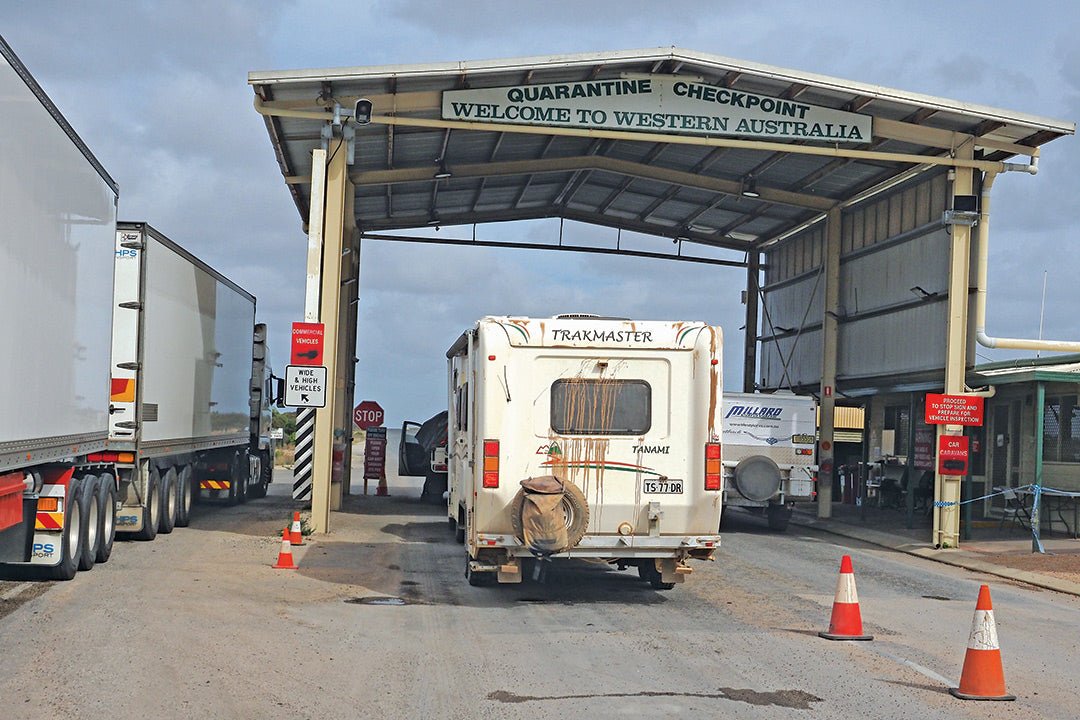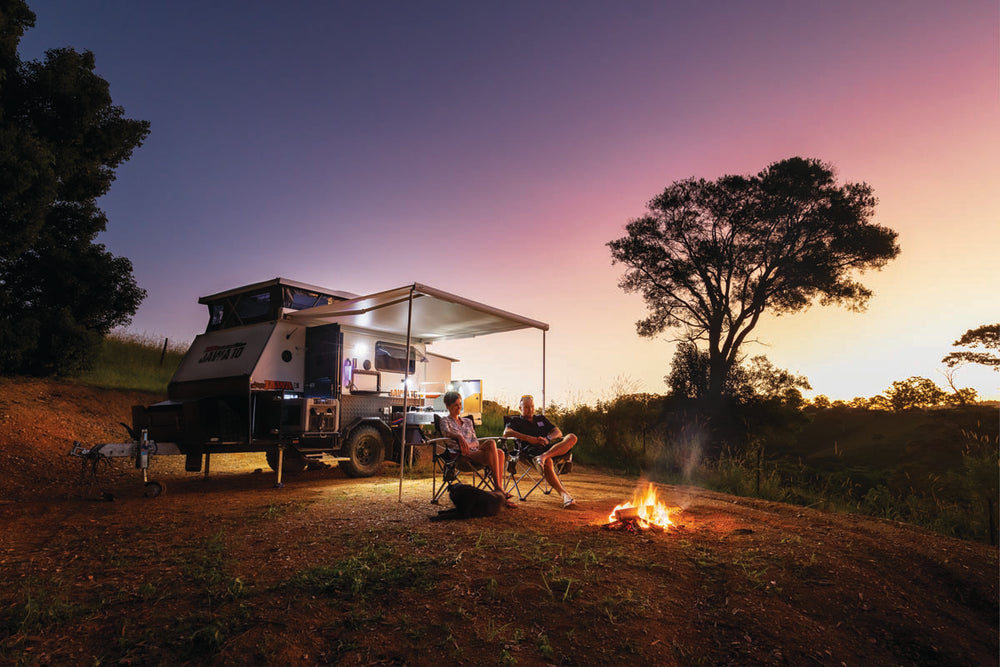

Even the most well-seasoned travellers need to sit down and plan out their next journey, considering everything from the season to the route you’ll be travelling.
One of the either ingrained or forgotten considerations for some travellers is the rules and regulations for carrying produce across state or territory borders throughout Australia. These rules and the specific items vary between and within states, and hefty fines can apply to those who break them. So, a quick refresh during your journey planning stage might save you a world of trouble in the long run.
I’m sure many of us can recall a family road trip or two that was brought to a halt when suddenly all the fresh fruit and produce your parents had been doling out in a responsible manner became an all-you-can-eat buffet. The ‘waste not want not’ mantra ruled with an iron first, because the idea of throwing the produce into the amnesty bins before crossing state lines was unthinkable.

Knowing what the rules are before you set out and how to find that information can save you from heavy on-the-spot fines or potentially causing a pest outbreak in protected areas.
Quarantine lines aren’t always as simple as state or territory borders, with various additional biosecurity zones throughout Australia (for example, northern Queensland has two). These rules have been put in place to protect Australia’s unique and fragile environment and to ensure the livelihoods of agricultural growers are safeguarded, so it is everyone’s obligation to ensure we act responsibly and plan accordingly.
Check before you travel
Before you hit the road or move to your next interstate location, remember to check any quarantine restrictions that might apply to your trip. The Australian Interstate Quarantine website offers a helpful tool for travellers to use when planning their journey. The website allows you to enter your departure and arrival points and provides information on the different quarantine and biosecurity zones you will be crossing, what they are protecting and what items you can and cannot take with you across the border or zone.
Avoiding uninvited hitchhikers
Pests (such as the infamous fruit fly), diseases and weeds can be spread through movement of many items, including:
- Plant or plant products
- Fruit and vegetables
- Animals or animal products
- Soil
- Agricultural machinery/other equipment

The most pertinent to your average intra and interstate travellers, of course, is fruit and vegetables. The rules on these differ from state to territory. For example, South Australia does not allow any fruit or fruiting vegetables from anywhere in Australia except for Tasmania. So, check online to ensure you know exactly what you can or cannot take with you — particularly if you won’t be passing through a quarantine centre and the responsibility to abide by the rules rests solely on you.
We must all do our bit to help minimise the risk of spreading these pests, diseases and weeds that can have a severe impact on Australia’s beautiful and unique environment, as well as the agricultural community.
Some examples of the pests that might be trying to get a free ride with you include the citrus red mite in New South Wales, phylloxera that lives in parts of New South Wales and Victoria and the tomato potato psyllid found near Perth.
The most notorious pest offender that tries to hitch a ride with travellers is the Queensland fruit fly, found in the east coast states and the NT but has not made its way to South Australia, Western Australia or Tasmania. The Mediterranean fruit fly is another offender and is quarantined within Western Australia.
Fruit flies are much smaller than your ordinary house fly and cannot travel very far, and as the name would suggest, infest fruit, and also vegetables. Infested fruit can look perfectly fine from the outside, but the inside often looks brown and mushy. Because of this, the public abiding by the rules plays a significant role in helping maintain the Fruit Fly Exclusion Zones (FFEZ) throughout Australia.

How to dispose of your produce
Often when preparing for a camping trip or holiday, stocking the pantry is a sign of forward-planning, especially if you have ravenous kids aboard. But if you’re going to be crossing any borders early on, checking the rules and restrictions ahead of time will save you having to devour or dump all prohibited fruit and veg. But waiting to buy produce at your destination or along the way once you cross the border is a great way to sample regional produce.
Whenever you reach a border with produce that can’t be taken across, you have a responsibility to eat it or bin it. Some interstate roads and quarantine zones do have inspection points where you can dispose of all prohibited items, but these do vary from state to state and not all areas have the amnesty/quarantine bins to ensure the produce is responsibly disposed of to prevent the spread of pests and diseases.

Here are your options when there is no designated inspection point or amnesty bin:
- Eat them before entering the state: if you are nearing the border and still have prohibited fruit and vegetables with you, consider consuming them before crossing the border.
- Give them away: if you manage to bump into any travellers heading the opposite way, consider giving your produce to them to enjoy.
- Bin them in a sealed bag: if you cannot consume or give away your produce, dispose of it in a sealed plastic bag and throw it in a bin. Make sure to seal the bag tightly to prevent any pests from escaping.
- Check with local authorities: some local councils have specific rules and regulations for disposing of fruit and vegetables.
It’s important to be aware of the quarantine rules and regulations when travelling between states and territories in Australia and to account for these restrictions in your initial journey planning. Carrying restricted products and items can have serious consequences for the environment and the agricultural industry. Travellers should always check the restrictions before moving to their next destination and dispose of restricted items responsibly. Remember, these rules are in place to protect Australia, and we all have a responsibility to do our part.
For the latest information
NSW and ACT
NSW Department of Primary Industries
P: 1800 680 244
E: quarantine@dpi.nsw.gov.au
Vic
P: 136 186
E: plant.standards@ecodev.vic.gov.au
Tas
Department of Natural Resources and Environment Tasmania
P: 03 6165 3777
E: biosecurity.tasmania@nre.tas.gov.au
SA
Primary Industries and Regions Biosecurity SA – Plant Health
P: 08 8207 7820
E: pirsa.planthealth@sa.gov.au
WA
Department of Primary Industries and Regional Development
P: 08 9334 1800
E: followup@dpird.wa.gov.au
NT
Department of Primary Industry and Resources, Biosecurity & Product Integrity Division NT Quarantine
P: 08 8999 2118
E: quarantine@nt.gov.au
Qld
Department of Agriculture and Fisheries Biosecurity Queensland
P: 13 25 23
E: info@daf.qld.gov.au
THE NEXT STEP
If you want to learn the latest caravan news, find the most innovative new caravans and camping gear or get inspired to plan your next outdoor adventure to some of Australia's best destinations, subscribe to our weekly newsletter. We promise to send you only the best content.
Related articles:
Heading off on an EV Big Lap | A family road trip adventure
Full-time towing with a big Chevy Silverado 2500







